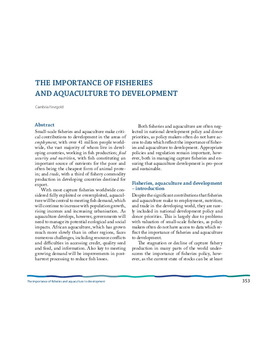The importance of fisheries and aquaculture to development

Citation
Finegold, C. (2009). The importance of fisheries and aquaculture to development. p. 353-364. In: Wramner, P. ; Cullberg, M. ; Ackefors, H. (eds.) Fisheries, sustainability and development. The Royal Swedish Academy of Agriculture and Forestry, Stockholm
Small-scale fisheries and aquaculture make critical contributions to development in the areas of employment, with over 41 million people worldwide, the vast majority of whom live in developing countries, working in fish production; food security and nutrition, with fish constituting an important source of nutrients for the poor and often being the cheapest form of animal protein; and trade, with a third of fishery commodity production in developing countries destined for export. With most capture fisheries worldwide considered fully exploited or overexploited, aquaculture will be central to meeting fish demand, which will continue to increase with population growth, rising incomes and increasing urbanisation. As aquaculture develops, however, governments will need to manage its potential ecological and social impacts. African aquaculture, which has grown much more slowly than in other regions, faces numerous challenges, including resource conflicts and difficulties in accessing credit, quality seed and feed, and information. Also key to meeting growing demand will be improvements in postharvest processing to reduce fish losses. Both fisheries and aquaculture are often neglected in national development policy and donor priorities, as policy makers often do not have access to data which reflect the importance of fisheries and aquaculture to development. Appropriate policies and regulation remain important, however, both in managing capture fisheries and ensuring that aquaculture development is pro-poor and sustainable.
Permalink
Date Available
Type
ISSN
0023-5350
Copyright
CC BY 4.0
Research Themes
Language